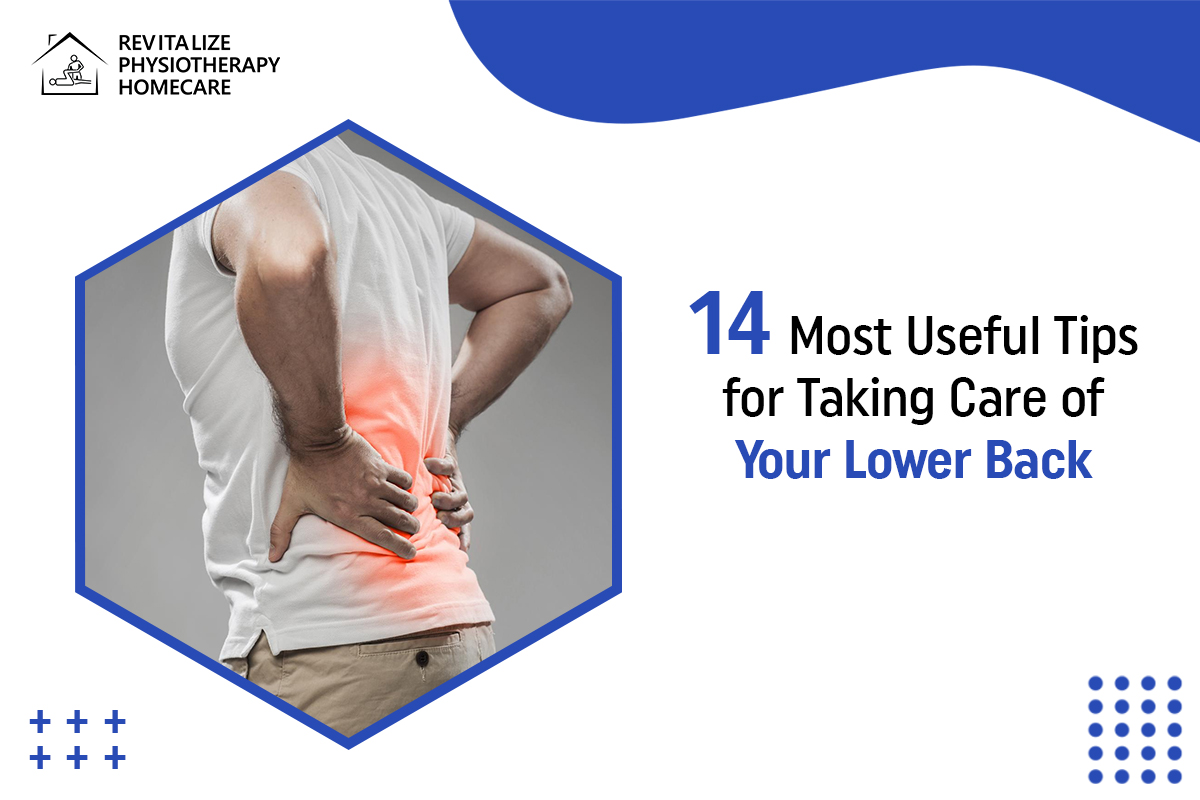14 Most Useful Tips for Taking Care of Your Lower Back
Back pain is a common issue that can disrupt daily life, yet many of us overlook the simple measures we can take at home to prevent or alleviate it. With more people working from home or engaging in less physical activity, taking care of our backs has become more important than ever.
But, there's good news! You can do many simple things right at home to keep your back healthy. This blog is all about easy-to-follow tips that will help you take care of your back. These tips are not just for those already undergoing lower back pain treatment Brampton but also for anyone who wants to prevent back issues in the future.
From proper posture to simple exercises, these simple strategies will guide you in maintaining a strong, healthy back and avoiding discomfort. Let's dive in and learn how to take care of your back every day, in easy and effective ways.
What is Back Pain?
Back pain is a common issue, with four in five adults experiencing it at some point. It's a leading cause of discomfort, second only to headaches, and often sends people to the doctor, just behind common cold symptoms. Recent studies have shown that structural problems like ruptured discs, arthritis, or tumours cause less than 15% of back pain cases. Also, back pain often comes from muscle imbalances around the spine or poor posture. Understanding these causes is key to caring for your back properly.
Main Causes of Back Pain
- Poor Posture: Bad posture puts extra strain on the neck and lower back. It can cause injuries and even affect how internal organs work.
- Lack of Exercise: Not exercising enough leads to weak muscles that struggle to support the body.
- Being Overweight: Extra weight increases the strain on your spine and muscles.
- Back Sprains: These happen when back muscles are used incorrectly, causing pain.
- Slipped or Ruptured Discs: When discs in the spine slip, they can pinch nerves and cause pain.
- Osteoarthritis: This is a painful part of ageing. Good posture and exercise can help lessen the pain.
- Tension and Stress: Daily life's stresses and worries can contribute to lower back pain.
Tips for Taking Care of Your Back at Home
1. Maintain Good Posture
Good posture is essential for back health. When standing, align your ears with your shoulders and hips for a straight posture. If you work at a desk, adjust your workstation to support proper posture. Your computer screen should be at eye level, and your knees should be at a slight angle. Consider standing desks or ergonomic chairs as they encourage proper posture. Frequent posture checks throughout the day can also help train your body to maintain the correct alignment.
2. Regular Stretching and Exercise
Stretching is vital for keeping muscles flexible and preventing stiffness. Incorporate a mix of stretches that target the back, neck, and legs. Yoga and Pilates are excellent for strengthening the core, which supports the back. Remember, consistency is key – make exercise a regular part of your routine. Even on busy days, a short walk or a few stretches can make a difference.
3. Lift Correctly
Proper lifting technique is crucial to avoid back injuries. If lifting something heavy, squat down to lift and rise using your legs, not your back. When carrying heavy items, keep them close to your body, and if an object is too heavy, don’t hesitate to ask for help or use a dolly. Practising these techniques in everyday situations will help protect your back from strain and potential injury.
4. Create an Ergonomic Work Environment
An ergonomic workspace can greatly reduce the risk of back pain. Adjust your chair to ensure both of your feet are flat on the floor while your knees are positioned at an angle of 90 degrees. Use a footrest if needed. If you use a laptop, consider a separate keyboard and mouse to maintain a comfortable position. Remember, your elbows should be at a right angle while typing. Taking short breaks every hour to stretch or walk around can also prevent muscle stiffness and improve circulation.
5. Use Supportive Mattress and Pillows
Sleeping on the right mattress and pillows is crucial for back health. Your mattress should be firm enough to support your body while accommodating its natural curves. Replace your mattress every 8-10 years. Additionally, the height and firmness of your pillows should keep your neck aligned with your spine. Side sleepers may benefit from a pillow between their knees, while back sleepers might prefer a pillow under their knees for added support.
6. Mind Your Diet and Weight
A balanced diet is key to maintaining a healthy back. Foods rich in calcium and vitamin D promote bone strength. Include whole grains, lean proteins, fruits, and veggies in your daily diet. Regular exercise not only helps in weight management but also strengthens the muscles around your spine. Even low-impact activities like walking or cycling can have significant benefits.
7. Practice Stress-Relief Techniques
High stress levels can cause your back muscles to tense up, leading to pain. Techniques like deep breathing, meditation, or gentle yoga can help release this tension. Create a regular routine to manage stress, such as dedicating a few minutes each day to relaxation exercises. Hobbies that relax your mind, like reading, gardening, or listening to music, can also help. Remember, taking time for yourself is not a luxury, but a necessity for your overall well-being.
8. Modify Activities and Hobbies
Adjust your activities to avoid back strain. For instance, when gardening, use a stool to sit on instead of bending over for extended periods. If you enjoy cycling, ensure your bike is properly fitted to your body to avoid hunching over. In hobbies that require standing for long periods, like cooking or painting, wear supportive shoes and stand on a cushioned mat.
9. Educate Yourself About Back Health
Knowledge is power when it comes to preventing back pain. Learn about the structure of the back, what causes pain, and how to avoid it. Understanding your body's mechanics can help you make better choices in your daily activities, from the way you sleep to how you lift heavy objects. There are plenty of resources available, including books, online courses, and workshops focused on back care.
10. Increase Calcium and Vitamin D Intake
Strong bones can help you avoid osteoporosis, a common cause of back pain, especially in older women. To keep your spine's bones strong, eat foods rich in calcium and vitamin D. Calcium can be found in milk, yogurt, leafy greens, and vitamin supplements. Vitamin D sources include fatty fish, egg yolks, beef liver, and cheese. However, don't forget to consult your physician before beginning any supplement regimen.
11. Change Your Shoes
Comfortable, low-heeled shoes can help prevent back pain. They don't put as much strain on your back when you stand. The best shoes for your back have heels less than 1 inch high.
12. Quit Smoking
Smoking is a big health risk and can also cause back pain. Smokers often have more back problems than non-smokers. This is partly because nicotine limits blood flow to the spine's disks, making them dry out or break. Smoking also lowers the oxygen in your blood, reducing nourishment to back muscles and tendons. A weaker back is more likely to get strains and injuries that cause pain.
13. Try Water Therapy
Water therapy is great for easing back pain, especially if you're older or find land exercises painful. Working out in water is gentle and can help build strength. It's a good way to start before moving to exercises on land.
14. Consult a Physiotherapist
If you have back or neck pain that keeps coming back or doesn't go away, see a doctor. They'll check for numbness, tingling, sciatica, or signs of nerve problems. Most of the time, you won't need surgery for back or neck pain. Your doctor might send you to an orthopedic surgeon for a closer look or to a physiatrist, who specializes in managing pain.
Conclusion
Taking care of your back at home involves simple yet impactful habits and changes in your daily routine. From maintaining good posture to practicing stress relief, these tips not only cater to those seeking low back physiotherapy Brampton but are also crucial for anyone aiming to maintain a healthy back.
If you need expert guidance or treatment for your lower back visit Revitalize Physiocare. We are a leading lower back pain clinic Brampton. Our expert physiotherapists treat various pain conditions including lower back pain.
To schedule an appointment for low back pain treatment, please contact us at 905-452-0222. Or, you can also send an email to us at revitalizephysio@gmail.com.





Comments are closed.